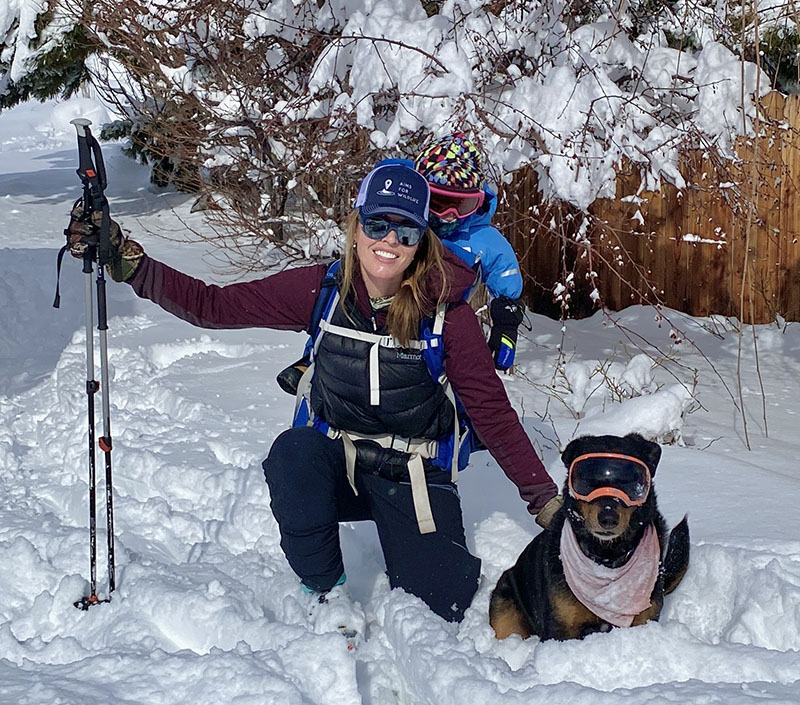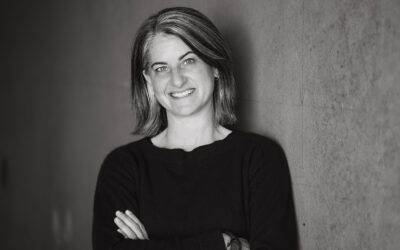Beatrice Gordon, Ph.D., joined DRI in 2023 as a postdoctoral researcher in the Division of Hydrologic Sciences. Beatrice, who also goes by “Bea,” is an interdisciplinary hydrologist with a deeply embedded concern for water availability born from her childhood on a Wyoming ranch. Last year, she primarily worked with Rosemary Carroll, Ph.D., on a USDA/NIFA-funded project examining how climate change impacts agriculture in the Western US. Now, she is focused on working with communities in rural Nevada to understand their needs for effective climate adaptation on a project with Carroll and Christine Albano, Ph.D.

In the following interview, Gordon discusses life on a ranch in water-scarce Wyoming, her newly published study about water vulnerability under climate change, and combining her research career with being a new mother.
DRI: Tell us about your background and what brought you to DRI.
Gordon: Well, I just gave a talk where someone described my background as being a bit of all over and I think that’s a pretty good characterization. I have an undergraduate degree in English and environmental history, but I grew up on a ranch, so I’ve always been really interested in how people use natural resources. I was more interested in how that informs the way that societies come about from a historical lens and the ways that we think about our relationship with nature through a literary lens, but I realized that my interests weren’t matching what I was doing for work, which was increasingly very science based. So, I went back to get my masters in my home state of Wyoming and then went back to Stanford to explore whether I wanted to do a Ph.D. During this time I ended up working a lot on California’s Central Valley — I think the thread for me has always been agriculture and water, because it’s what I grew up knowing and thinking about. I wasn’t convinced I wanted to do a Ph.D. unless it was a project that seemed like it was in service of broader society, but when the opportunity to pursue a Ph.D. at UNR with Adrian Harpold funded by the USDA came up, I took it and I’m so glad I did. Adrian is a great mentor who has been so supportive and engaged in my career, which is rare. I wound up at DRI because of Rosemary Carroll, who was on my Ph.D. committee, and I stayed at DRI because of Rosemary, Gabrielle Boisramé, Christine Albano, and Yvonne Rumbaugh. I really appreciate that I have a lot of flexibility to pursue different interests and collaborations here – I’m grateful for that.
DRI: How did you originally become interested in hydrology?
Gordon: I grew up irrigating alfalfa on my family’s cattle ranch as a kid, so I realized early on how essential water is for lots of communities. And living right next to a mountain range, it’s hard not to connect water with snow.
I have a lot of childhood memories that center around water, some of them reinforce its importance more than others: I went to help someone move their cows and didn’t properly check on one of our stock tanks in the hills. It turned out the float was broken, and I drained the entire storage tank. It was awful and it’s something that still comes up with family and friends to this day, and I still feel horrible about it. It’s hard for me not to prioritize water reflecting on that experience. There’s not a lot of it, and moving it to places where you need it is a big deal, and then wasting it is devastating.
DRI: What research are you excited to pursue here at DRI?
Gordon: I’m really excited about working with rural Nevada stakeholders to understand what they need to adapt to climate change and compare that with how some of our data-driven models might drive climate adaptation. I’m eager to explore where there’s overlap and where there’s maybe dissonance. I think that particularly when it comes to adaptation, there’s such an opportunity to work with folks to understand more about what they’re using to make decisions and to incorporate that into our science and our models. I’m excited to work with social scientists and stakeholders and economists and understand more about how we can accurately characterize what’s happening and what’s needed in communities.
DRI: You recently published a study that examines water vulnerability under a changing climate. Can you tell us about it?
Gordon: I think one of the things I’ve found really challenging is how the frameworks for thinking about these big concepts like vulnerability, resilience, and risk under climate change translate to people who are making decisions about how we adapt to these changing conditions. I think the challenge is that a lot of times, the approaches that we’re developing may work for one system, but we then assume it applies everywhere. Or we’re not really providing people who would be designing these assessments with the tools they would need to build from the ground up.
One of the things we wanted to investigate is how to use these great advances and put the ball back into the stakeholders’ or decision makers’ or policymakers’ court and say, ‘Here are the wealth of different things that we can measure when it comes to what systems might be confronting in a changing climate.’ And I think indicators are a great way to talk across disciplines – for example, we can talk about access to healthcare, and we can also talk about changes in precipitation — and you can think about combining those in these interesting ways, which I think is such an awesome aspect of cross disciplinary research.
DRI: What do you want your DRI colleagues to know about you?
Gordon: I really enjoy the process of writing scientific manuscripts. I think it’s really challenging but also very rewarding — especially introductions and finding ways to frame the study well.
DRI: What do you like to do outside of work?
Gordon: I spend a lot of time being a parent to my young son, Crawford. Rosemary is such an incredible mentor when it comes to having and prioritizing a family, as are Adrian, Gabrielle Boisramé, and Alex Lutz. I feel lucky that I work with a lot of parents and mothers in particular — being able to have that be a part of my identity as a scientist is important and not something I feel like I need to hide. Realistically, both my spouse, Austen, and I work in science, which means that there isn’t a lot of free time, but we love to go on family hikes. I still love skiing, but I don’t get to do it as much. I like running and spending time with my dog, Sawyer. And I read, but all those things feel really secondary to trying to be present as a mother.
DRI: If you could recommend one book to your DRI colleagues, what would it be?
Gordon: I think anything N.K. Jemisin writes is really fantastic. Some of the books that she’s written, like the Broken Earth trilogy, really foreground climate issues in a very interesting way and she has mentioned how NASA workshops have influenced her, which I think is so cool.
DRI: Anything else you think is important to share?
Gordon: I just want to give a big shout out to the fantastic mentors in the DRI community. Ro (Rosemary), Gabrielle, and Christine have been so supportive of me. And Yvonne, the business manager at DHS, because I learn so much from her and appreciate her willingness to walk me through applying for grants and other tasks like that. I think that we sometimes focus so much on the science, and we don’t focus as much on the support available at DRI.
For more info on Bea, visit her personal website: https://www.beatricelgordon.com/


